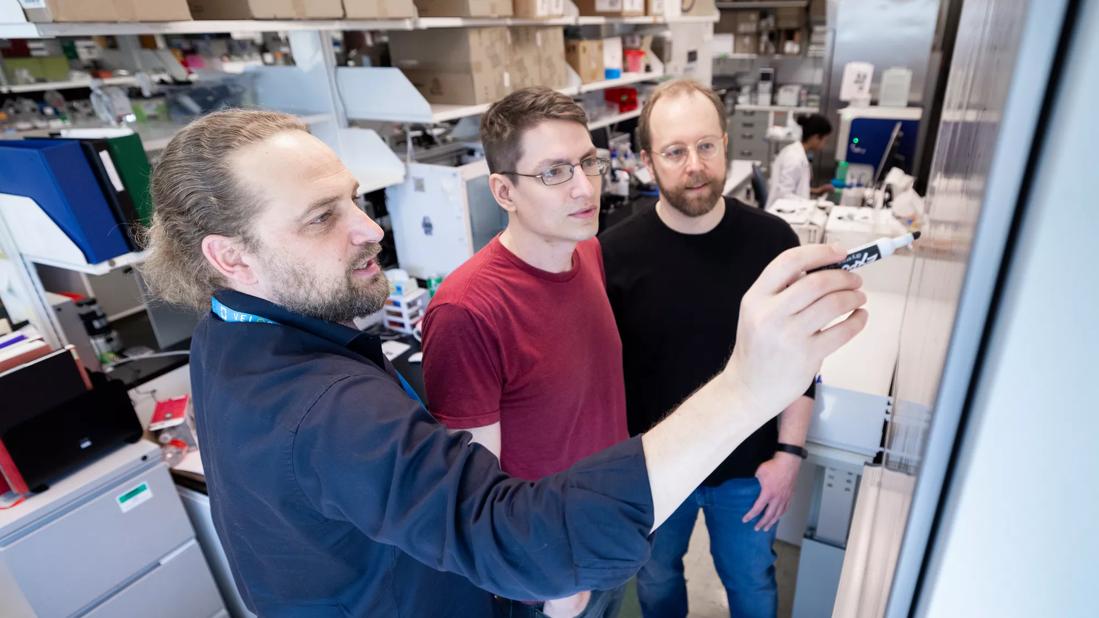Searching for new insights into drug resistance, collateral sensitivity

Jacob Scott, MD, Phil, a physician-researcher specializing in mathematical oncology in Cleveland Clinic Cancer Center’s Department of Translational Hematology and Oncology Research, recently received a seven-year, $4 million grant from the National Cancer Institute (NCI). The funding will support Dr. Scott’s research into how ecological and evolutionary mechanisms contribute to lung cancer development and progression, and how the interplay between these mechanisms may provide novel insights into treatment and drug resistance.
Advertisement
Cleveland Clinic is a non-profit academic medical center. Advertising on our site helps support our mission. We do not endorse non-Cleveland Clinic products or services. Policy
With this grant, Dr. Scott will build on two major research initiatives:
The first, described in a recent Nature Ecology and Evolution study, probes the evolutionary strategies that various cell populations in a tumor use to survive, proliferate and confer resistance to therapy.
The study details how Dr. Scott and his team developed a first-in-class test, based on game theory, to directly quantify and characterize the ecological forces (interactions among cells), the evolutionary mechanisms (cell mutation and selection) that lead to the treatment resistance commonly observed in cancer cells, and if and how those forces and mechanisms change due to treatment. The researchers measured and compared growth rates of non-small cell lung cancer cells sensitive or resistant to the drug alectinib, an anaplastic lymphoma kinase (ALK) inhibitor.
The study provides important insights into when and under what conditions resistant cells predominate over sensitive cells. The results suggest that the classic model of resistance — in which the evolution of resistance may carry an inherent cost in the absence of treatment — may need to be modified to account for what the researchers observed in vitro: that resistant cells have higher fitness than parental cells in the same environment, even in the absence of drug therapy.
The findings support the feasibility of a more sophisticated approach to cancer treatment than just attacking tumor cells. The focus is on altering competition dynamics among tumor cell populations by manipulating their micro-environment and interactions, thereby enabling evolution to drive the tumor to a more desirable outcome than conventional therapy can achieve.
Advertisement
The NCI funds will enable Dr. Scott’s laboratory to continue this line of investigation — this time not just measuring conditions in which resistant cells overpower sensitive cells, but also manipulating the cells and assessing the outcome.
“Due to the heterogeneous nature of most tumors, developing a single silver bullet is not necessarily the answer to treating cancer,” says Dr. Scott, who is a practicing radiation oncologist in the Department of Radiation Oncology. “We may already have effective treatments within reach. We need to identify the optimal therapeutic combination and sequence to tackle each individual cancer.”
Dr. Scott’s second NCI-supported effort will dig deeper into the problem of drug resistance and the emerging treatment strategy of collateral sensitivity — an evolution-driven phenomenon observed when treatment with one drug induces susceptibility to a second. That work will capitalize on advances described in recent papers appearing in Nature Communications and Nature Scientific Reports.
In the first publication, he and his team studied antibiotic resistance and collateral sensitivity.
Through in vitro cellular evolution experiments, the researchers found that exposing Escherichia coli bacteria to sequential drug regimens may cause increased resistance rather than the desired increase in susceptibility, with genetic divergence dictating this differential response. Collateral sensitivity is rare and never universal, the investigators determined. The results show that clinicians need reliable probabilistic predictors of the outcome of evolution-based sequential drug therapies.
Advertisement
Dr. Scott and his collaborators defined a mathematical model that forecasts the likelihood of collateral sensitivity.
In the second study, Dr. Scott and his colleagues examined the evolution of resistance in ALK-positive non-small cell lung cancer NSCLC. The researchers evolved NSCLC cell lines resistant to ALK inhibitors, then observed and analyzed resistance patterns and collateral sensitivity after drug holidays of multiple durations and exposure to other anti-cancer agents.
They found that the evolution of resistance to targeted therapies in NSCLC and the status of collateral sensitivity is highly changeable over time, with many opportunities to re-establish drug sensitivity in previously resistant situations. The researchers concluded that time-variable treatment strategies such as drug cycling and drug holidays potentially could help combat resistance.
Leveraging this effort with the NCI funds, Dr. Scott will search for patterns in drug sensitivity and resistance to try to better understand when the switch from sensitivity to resistance flips, and what molecular characteristics may be predictive of that change. Defining these molecular hallmarks will be a critical step that eventually may help clinicians better track the progression of a patient’s cancer and anticipate necessary treatment changes.
“The question we are most interested in answering is not ‘which treatment is best?’ but ‘in what combination and order is best?’” said Dr. Scott. “Understanding the ecological and evolutionary dynamics, how to interrupt them, and how to tell when the balance starts to tip towards resistance will be crucial in getting to the bottom of that question.”
Advertisement
Advertisement

Radiation therapy helped shrink hand nodules and improve functionality

Standard of care is linked to better outcomes, but disease recurrence and other risk factors often drive alternative approaches

Phase 1 study demonstrates immune response in three quarters of patients with triple-negative breast cancer

Multidisciplinary teams bring pathological and clinical expertise

Genetic variants exist irrespective of family history or other contributing factors

Study shows significantly reduced risk of mortality and disease complications in patients receiving GLP-1 agonists

Structured interventions enhance sleep, safety and caregiver resiliency in high-acuity units

Addressing rare disease and challenging treatment course in an active young patient